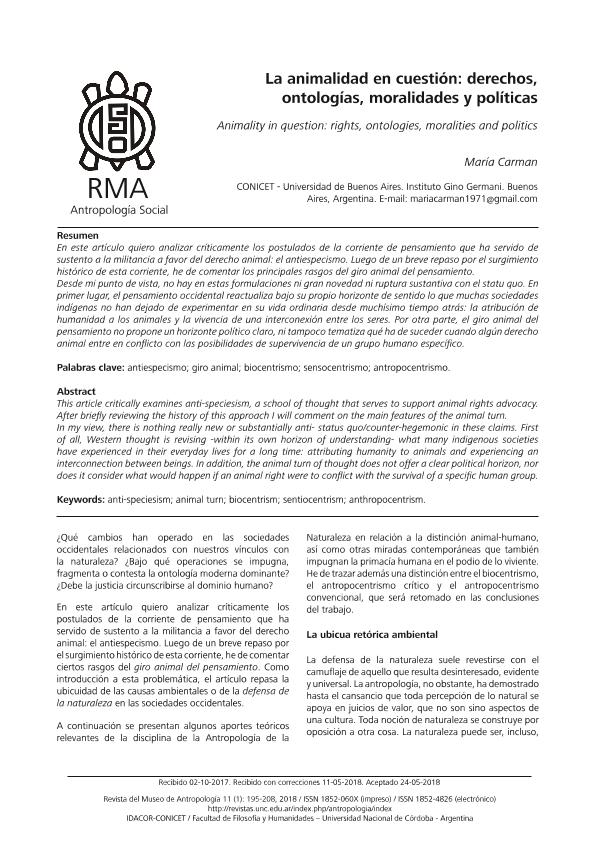Mostrar el registro sencillo del ítem
dc.contributor.author
Carman, Maria

dc.date.available
2022-11-02T13:54:51Z
dc.date.issued
2018-07
dc.identifier.citation
Carman, Maria; La animalidad en cuestión: derechos, ontologías, moralidades y políticas; Universidad Nacional de Córdoba; Revista del Museo de Antropologia; 11; 1; 7-2018; 195-208
dc.identifier.issn
1852-060X
dc.identifier.uri
http://hdl.handle.net/11336/175968
dc.description.abstract
En este artículo quiero analizar críticamente los postulados de la corriente de pensamiento que ha servido de sustento a la militancia a favor del derecho animal: el antiespecismo. Luego de un breve repaso por el surgimiento histórico de esta corriente, he de comentar los principales rasgos del giro animal del pensamiento. Desde mi punto de vista, no hay en estas formulaciones ni gran novedad ni ruptura sustantiva con el statu quo. En primer lugar, el pensamiento occidental reactualiza bajo su propio horizonte de sentido lo que muchas sociedades indígenas no han dejado de experimentar en su vida ordinaria desde muchísimo tiempo atrás: la atribución de humanidad a los animales y la vivencia de una interconexión entre los seres. Por otra parte, el giro animal del pensamiento no propone un horizonte político claro, ni tampoco tematiza qué ha de suceder cuando algún derecho animal entre en conflicto con las posibilidades de supervivencia de un grupo humano específico.
dc.description.abstract
This article critically examines anti-speciesism, a school of thought that serves to support animal rights advocacy. After briefly reviewing the history of this approach I will comment on the main features of the animal turn. In my view, there is nothing really new or substantially anti- status quo/counter-hegemonic in these claims. First of all, Western thought is revising -within its own horizon of understanding- what many indigenous societies have experienced in their everyday lives for a long time: attributing humanity to animals and experiencing an interconnection between beings. In addition, the animal turn of thought does not offer a clear political horizon, nor does it consider what would happen if an animal right were to conflict with the survival of a specific human group.
dc.format
application/pdf
dc.language.iso
spa
dc.publisher
Universidad Nacional de Córdoba
dc.rights
info:eu-repo/semantics/openAccess
dc.rights.uri
https://creativecommons.org/licenses/by-nc-sa/2.5/ar/
dc.subject
ANTIESPECISMO
dc.subject
GIRO ANIMAL
dc.subject
ANTROPOCENTRISMO
dc.subject
SENSOCENTRISMO
dc.subject.classification
Otras Humanidades

dc.subject.classification
Otras Humanidades

dc.subject.classification
HUMANIDADES

dc.title
La animalidad en cuestión: derechos, ontologías, moralidades y políticas
dc.title
Animality in question: rights, ontologies, moralities and politics
dc.type
info:eu-repo/semantics/article
dc.type
info:ar-repo/semantics/artículo
dc.type
info:eu-repo/semantics/publishedVersion
dc.date.updated
2022-11-01T18:14:02Z
dc.journal.volume
11
dc.journal.number
1
dc.journal.pagination
195-208
dc.journal.pais
Argentina

dc.journal.ciudad
Córdoba
dc.description.fil
Fil: Carman, Maria. Consejo Nacional de Investigaciones Científicas y Técnicas; Argentina. Universidad de Buenos Aires. Facultad de Ciencias Sociales. Instituto de Investigaciones "Gino Germani"; Argentina
dc.journal.title
Revista del Museo de Antropologia
dc.relation.alternativeid
info:eu-repo/semantics/altIdentifier/url/https://revistas.unc.edu.ar/index.php/antropologia/article/view/18062
dc.relation.alternativeid
info:eu-repo/semantics/altIdentifier/doi/https://doi.org/10.31048/1852.4826.v11.n1.18062
Archivos asociados
